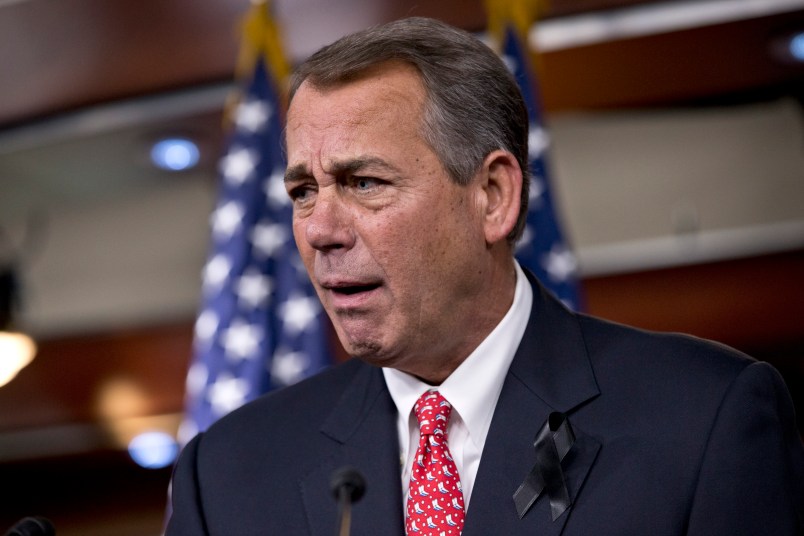A new line of bad Obamacare news made the rounds in conservative circles this week: One insurance company, Humana, said it could receive up to $450 million in 2014 through the various provisions in the law that were designed to help insurers make the transition to its reforms.
It was picked up by Scott Gottlieb, a resident fellow at the conservative American Enterprise Institute, who wrote about the report for Forbes. He cited Humana executives who said that the Obamacare “bailout” — as Republicans have dubbed those provisions — would cost up to $450 million to cover their company.
His report was soon referenced by National Review Online, HotAir, NewsMax and others — many of whom noted that this huge bailout was for “just one insurer.” It sounds, when you put it like that, like another health care disaster for the White House.
(To be fair, mainstream outlets like Reuters also picked up the news, but they refrained from using the word “bailout.”)
As is often the case, the whole story is a bit more complicated. For starters, these so-called “bailouts” are provisions very intentionally included in the law. The three R’s as they’re known — risk adjustment, reinsurance and risk corridors — work differently but achieve the same goal: making sure insurance companies don’t lose too much money on new Obamacare enrollees, which should prevent any huge premiums next year and onward.
To put it simply: An insurance company receiving money through those programs is just the law working as it’s supposed to. And, the way the programs are designed, some companies could end up paying money to the government if they perform better than expected.
Here’s what the Humana executives said on the investor call that started the whole episode: They expect to receive between $250 million and $450 million through the three R’s next year. Steven McCulley, interim chief financial officer, said that “is still a fairly wide range because it’s very early in the process.”
So the margin-of-error for what Humana could ultimately receive is very wide. Why are they expecting to receive that kind of money? James Murray, chief operating officer, said that “there was a bit of a deterioration in the risk mix” — in other words, they expect to enroll a sicker population through the law because the White House allowed people to keep their non-Obamacare compliant plans rather than sign up for new coverage through HealthCare.gov or the states.
Bruce Boussard, Humana’s CEO, seemed to contradict that earlier in the call when he said Obamacare enrollees are “skewing a bit more to the younger side” — which would suggest a healthier population — but the company did not return TPM’s multiple requests for clarification.
The other problem, Murray said, is that Humana hasn’t signed up as many people as it expected: about 200,000 so far. That isn’t enough to match the administrative investments that the company made in anticipation of the health care reform law’s launch.
“When we don’t get the revenue that we anticipated and we’ve built the administrative infrastructure to support that, we have a scale issue,” he said.
So exactly how big Humana’s “bailout” will be is uncertain at best. But irrespective of the precise number, Obamacare is supposed to provide this kind of support to insurance companies. It’s part of the deal, and it’s supposed to help prevent exorbitant premium increases that will make coverage unaffordable for people.
Also, one company’s experience isn’t definitive evidence that the whole program is failing. Take the latest Congressional Budget Office report on Obamacare and the risk corridor program specifically. CBO projected that the federal government would actually receive a net gain of $8 billion. That estimate included, though, the expectation that the government would bring in $16 billion from insurers that do better than expected under Obamacare and pay out $8 billion to companies that do worse.
The CBO estimates could be flawed, as Business Insider’s Josh Barro explained. But the point is: Obamacare can still be working even if Humana receives a payout because it underperformed. That’s part of the law’s design. Using one’s company experience as evidence that health care reform as a whole is failing ignores the rest of the story.






